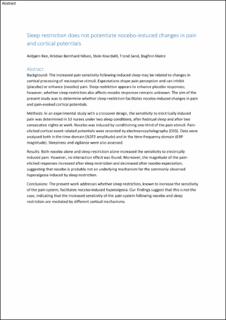| dc.contributor.author | Ree, Anbjørn | |
| dc.contributor.author | Nilsen, Kristian Bernhard | |
| dc.contributor.author | Knardahl, Stein | |
| dc.contributor.author | Sand, Trond | |
| dc.contributor.author | Matre, Dagfinn | |
| dc.date.accessioned | 2020-04-14T10:06:04Z | |
| dc.date.available | 2020-04-14T10:06:04Z | |
| dc.date.created | 2019-08-08T12:19:10Z | |
| dc.date.issued | 2019 | |
| dc.identifier.citation | European Journal of Pain. 2019, 24 (1), 110-121. | en_US |
| dc.identifier.issn | 1090-3801 | |
| dc.identifier.uri | https://hdl.handle.net/11250/2650933 | |
| dc.description.abstract | Background: The increased pain sensitivity following reduced sleep may be related to changes in cortical processing of nociceptive stimuli. Expectations shape pain perception and can inhibit (placebo) or enhance (nocebo) pain. Sleep restriction appears to enhance placebo responses; however, whether sleep restriction also affects nocebo responses remains unknown. The aim of the present study was to determine whether sleep restriction facilitates nocebo‐induced changes in pain and pain‐evoked cortical potentials. Methods: In an experimental study with a crossover design, the sensitivity to electrically induced pain was determined in 53 nurses under two sleep conditions, after habitual sleep and after two consecutive nights at work. Nocebo was induced by conditioning one‐third of the pain stimuli. Pain‐elicited cortical event‐related potentials were recorded by electroencephalography (EEG). Data were analysed both in the time‐domain (N2P2 amplitude) and in the time‐frequency domain (ERP magnitude). Sleepiness and vigilance were also assessed. Results: Both nocebo alone and sleep restriction alone increased the sensitivity to electrically induced pain. However, no interaction effect was found. Moreover, the magnitude of the pain‐elicited responses increased after sleep restriction and decreased after nocebo expectation, suggesting that nocebo is probably not an underlying mechanism for the commonly observed hyperalgesia induced by sleep restriction. Conclusions: The present work addresses whether sleep restriction, known to increase the sensitivity of the pain system, facilitates nocebo‐induced hyperalgesia. Our findings suggest that this is not the case, indicating that the increased sensitivity of the pain system following nocebo and sleep restriction are mediated by different cortical mechanisms. | en_US |
| dc.language.iso | eng | en_US |
| dc.publisher | Wiley | en_US |
| dc.title | Sleep restriction does not potentiate nocebo‐induced changes in pain and cortical potentials | en_US |
| dc.type | Peer reviewed | en_US |
| dc.type | Journal article | en_US |
| dc.description.version | acceptedVersion | en_US |
| dc.source.pagenumber | 110-121 | en_US |
| dc.source.volume | 24 | en_US |
| dc.source.journal | European Journal of Pain | en_US |
| dc.source.issue | 1 | en_US |
| dc.identifier.doi | 10.1002/ejp.1466 | |
| dc.identifier.cristin | 1714824 | |
| dc.description.localcode | Locked until 5.8.2020 due to copyright restrictions. This is the peer reviewed version of an article, which has been published in final form at [https://doi.org/10.1002/ejp.1466]. This article may be used for non-commercial purposes in accordance with Wiley Terms and Conditions for Self-Archiving. | en_US |
| cristin.unitcode | 194,65,30,0 | |
| cristin.unitcode | 1920,16,0,0 | |
| cristin.unitname | Institutt for nevromedisin og bevegelsesvitenskap | |
| cristin.unitname | Nevroklinikken | |
| cristin.ispublished | true | |
| cristin.fulltext | original | |
| cristin.qualitycode | 1 | |
